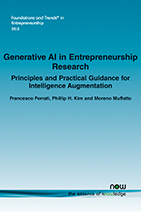Generative AI in Entrepreneurship Research: Principles and Practical Guidance for Intelligence Augmentation
By Francesco Ferrati, School of Entrepreneurship (SCENT), Department of Industrial Engineering, University of Padova, Italy, francesco.ferrati@unipd.it | Phillip H. Kim, Arthur M. Blank Center for Entrepreneurship, Babson College, USA, pkim1@babson.edu | Moreno Muffatto, School of Entrepreneurship (SCENT), Department of Industrial Engineering, University of Padova, Italy, moreno.muffatto@unipd.it
Abstract
This monograph investigates the integration of generative artificial intelligence (AI) into the academic research process of entrepreneurship. Specifically, we explore using Large Language Models (LLMs) like ChatGPT in several research scenarios to support novice and established researchers. As a practical guide, we introduce researchers to prompt engineering – formulating instructions for the LLMs to generate a desired output. We classify different types of prompts, present various technical strategies, and suggest the design of an effective prompt formula. We illustrate the prompt engineering process with different examples for entrepreneurship research.
To assist researchers in systematically integrating LLMs into their research process, we present the “4D-Framework,” which consists of four phases (Discover, Develop, Discuss, and Deliver). Each phase contains four functions accomplished through four prompts, resulting in 16 functions and 64 specific prompts. The initial stage, “Discover,” involves using LLMs for project initiation tasks such as topic selection and literature review, theory exploration, conceptual or empirical puzzles, and research question identification. During the “Develop” phase, the focus shifts to operational aspects, where LLMs assist in designing methods, executing qualitative and quantitative research, and generating programming code. The third phase, “Discuss,” focuses on using LLMs to analyze findings, evaluate their robustness and limitations, highlight the research contribution, and identify future research directions. Finally, the “Deliver” phase emphasizes using LLMs to draft the manuscript, craft the narrative, prepare for submission, and disseminate the findings.
We describe the application of LLMs in entrepreneurship research from a human-centric perspective, emphasizing an Intelligence Augmentation (IA) perspective for harmonizing human intelligence with AI capabilities. Given the novelty and impact of LLMs in knowledge-based areas, we also address the ethical implications of using AI in academia. We urge scholars to incorporate AI and LLMs into their research responsibly. While showcasing their potential, we also address their current limitations. We empower scholars to adopt a dynamic, AI-enhanced research approach that emphasizes the potential to unlock new insights and enhance the integrity of academic research.
Generative AI in Entrepreneurship Research: Principles and Practical Guidance for Intelligence Augmentation
Generative AI in Entrepreneurship Research provides practical guidance for how generative AI can be applied to entrepreneurship research and how scholars can integrate LLMs into their work. Two objectives of this monograph are to provide researchers with guidance not only for using LLMs as a tool for data analysis and modeling but also to offer a more holistic approach to integrating AI to augment researchers’ capabilities throughout the entire research process. Just as researchers need to understand AI applications in the work of entrepreneurs, we also need to reconsider how AI technologies can empower entrepreneurship researchers. This monograph is written for these audiences and others who wish to use LLMs for their research under the principles of Intelligence Augmentation. While the focus is entrepreneurship research applications, this framework is presented in ways that can be easily adapted to other disciplines.
